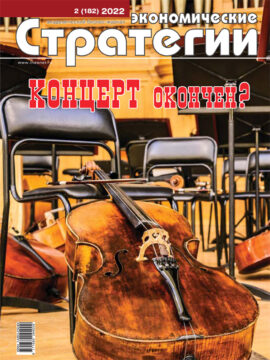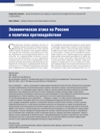The Economic Attack on Russia and the Policy of Counteraction
DOI: https://doi.org/10.33917/es-2.182.2022.40-47
The purpose of the study is to show the patterns of the deployment of an economic attack on Russia. The research methodology is a comparative and retrospective analysis, elements of a structural approach. In the course of the analysis, a result was obtained that boils down to the fact that the current model of the world economy with a high level of integration and dependence of the economy poses a threat to the national security of the country. Economic warfare is carried out through damaging sanctions. Good conditions for it were created by the liberal economic policy pursued in Russia, which held back growth. Moreover, such outcomes are typical not only for economic activity, but also for the functioning of science and education — “invisible” sanctions, which creates a long-term perspective of dependent and driven development. It is necessary to ensure control over the distribution of property owners in the domestic market, planning procedures that are reduced to the establishment of thresholds in the field of imports, exports in various areas of activity, as well as the admission of foreign resources and institutional rules to the domestic market. With the implementation of such an institutional policy, sanctions would cause much less damage or their negative effect would be absent. Today, it is necessary to resist the economic attack by maximizing the withdrawal of assets from the dollar denomination, pursuing an anti-devaluation policy, cutting off the banking system from the speculative depreciation game, and intensifying efforts to replace imports in each industry. It is required to close the contours of production to the domestic market with the re-profiling of production, practicing the seizure of foreign property as a response to similar external actions. Such actions require a systematic state policy in all areas of coordination of industries and activities.
Источники:
1. Glaz’ev S.Yu. Bitva za lide rstvo v XXI veke. Rossiya, SShA, Kitai. Sem’ variantov blizhaishego budushchego [The Battle for Leadership in the XXI Century. Russia, USA, China. Seven Options for the Near Future]. Moscow, Knizhnyi mir, 2017, 352 p.
2. L’vov D.S. Ekonomika razvitiya [Development Economics]. Moscow, Ekzamen, 2002, 512 p.
3. Sukharev O.S. “Izvrashchennyi monetarism” budet diktovat’ ekonomicheskuyu strategiyu razvitiya Rossii? [“Perverted Monetarism” will Dictate the Economic Development Strategy of Russia?]. Investitsii v Rossii, 2017, no 6, pp. 27–35.
4. Krugman P. Depressii — eto nechto inoe [Depression is Something Else]. Ekonomika dlya lyuboznatel’nykh: o chem razmyshlyayut nobelevskie laureaty. Moscow, Izd-vo instituta Gaidara, 2017, pp. 26–27.
5. Sukharev O.S. Ekonomicheskie sanktsii: problema otsenki ushcherba [Economic Sanctions: the Problem of Damage Assessment]. Ekonomika i predprinimatel’stvo, 2017, no 8-4, vol. 11, pp. 80–87.
6. Anchishkin A.I. Prognozirovanie tempov i faktorov ekonomicheskogo rosta [Forecasting Rates and Factors of Economic Growth]. Moscow, Maks-Press, 2003, 300 p.
7. Khelpman E. Zagadka ekonomicheskogo rosta [The Growth Mystery]. Moscow, Izd-vo Instituta Gaidara, 2011, 240 p.
8. Erkhard L. Blagosostoyanie dlya vsekh [Welfare for All]. Moscow, Delo, 2001, 352 p.
9. Ageev A.I. “Obraz budushchego”: renessans planirovaniya [Vision of the Future: Planning Renaissance]. V sb. Statei konferentsii “Obraz budushchego”, 19–20 fevralya 2021 g. FGBOU VO “OGU imeni I.S. Turgeneva” [Collection of Articles of the Conference “Image of the Future”, February 19–20, 2021 Turgenev”]. Orel, Kartush, 2021, pp. 39–49.
10. Sukharev O.S. Konkurentsiya kak protsedura “zakrytiya” [Competition as a “Closing” Procedure]. Investitsii v Rossii, 2001, no 2, pp. 16–25.
11. Ageev A.I., Zolotareva O.A. Metriki ustoichivosti ekonomicheskogo razvitiya EAES: problema “yadra” sistemy pokazatelei i porogovykh znachenii [Sustainability Metrics of the EAEU Economic Development: Problem of the “Core” of the Indicators and Thresholds System]. Ekonomicheskie strategii, 2021, no 5, pp. 54–65, DOI: 10.33917/es-5.179.2021.54-65.
12. Federal’naya sluzhba gosudarstvennoi statistiki, available at: http://www.gks.ru/wps/wcm/connect/rosstat_main/rosstat/ru/statistics/accounts/#
13. Liberal’noe gnezdo v ekonomike mozhet podorvat’ bor’bu protiv sanktsii [Liberal Nest in the Economy Could Undermine the Fight Against Sanctions]. Russkaya narodnaya liniya, 2022, March, 7, available at: https://ruskline.ru/news_rl/2022/03/07/liberalnoe_gnezdo_v_ekonomike_mozhet_podorvat_borbu_protiv_sankcii_
14. Otkrytoe publichnoe zayavlenie Obshchestvennogo komiteta po pravam cheloveka ot 1 marta 2022 g. Prezidentu RF V.V. Putinu i Direktoru FSB Rossii A.V. Bortnikovu po navyazannym anglosaksonskim kommercheskim indeksam Web of Science i Scopus [Open Public Statement of the Public Committee on Human Rights Dated March 1, 2022 to the President of the Russian Federation V.V. Putin and Director of the FSS of Russia A.V. Bortnikov According to the Imposed Anglo-Saxon Commercial Indices Web of Science and Scopus]. Nravstvennost’ i zakon, 2022, available at: https://moral-law.ru/index.php?p=post&id=205.
15. Sukharev O.S. Sovremennyi mirovoi krizis i Rossiya: diagnostika i strategiya preodoleniya [Modern World Crisis and Russia: Diagnostics and Status of Overcoming]. Ekonomicheskie strategii, 2020, no 6, pp. 20–31, DOI: 10.33917/es-6.172.2020.20-31.



